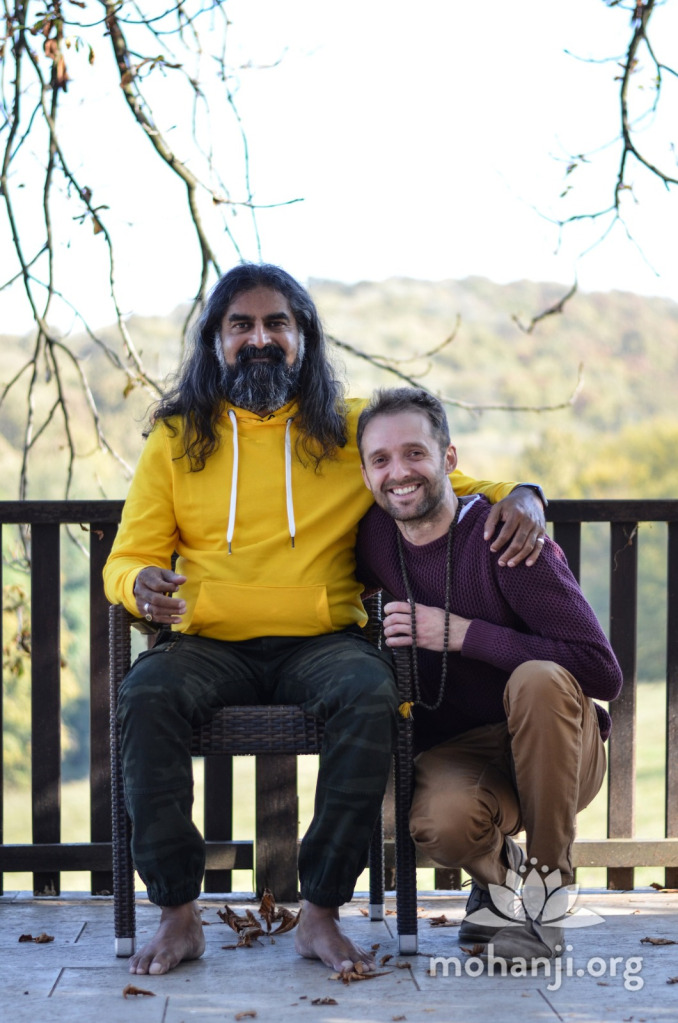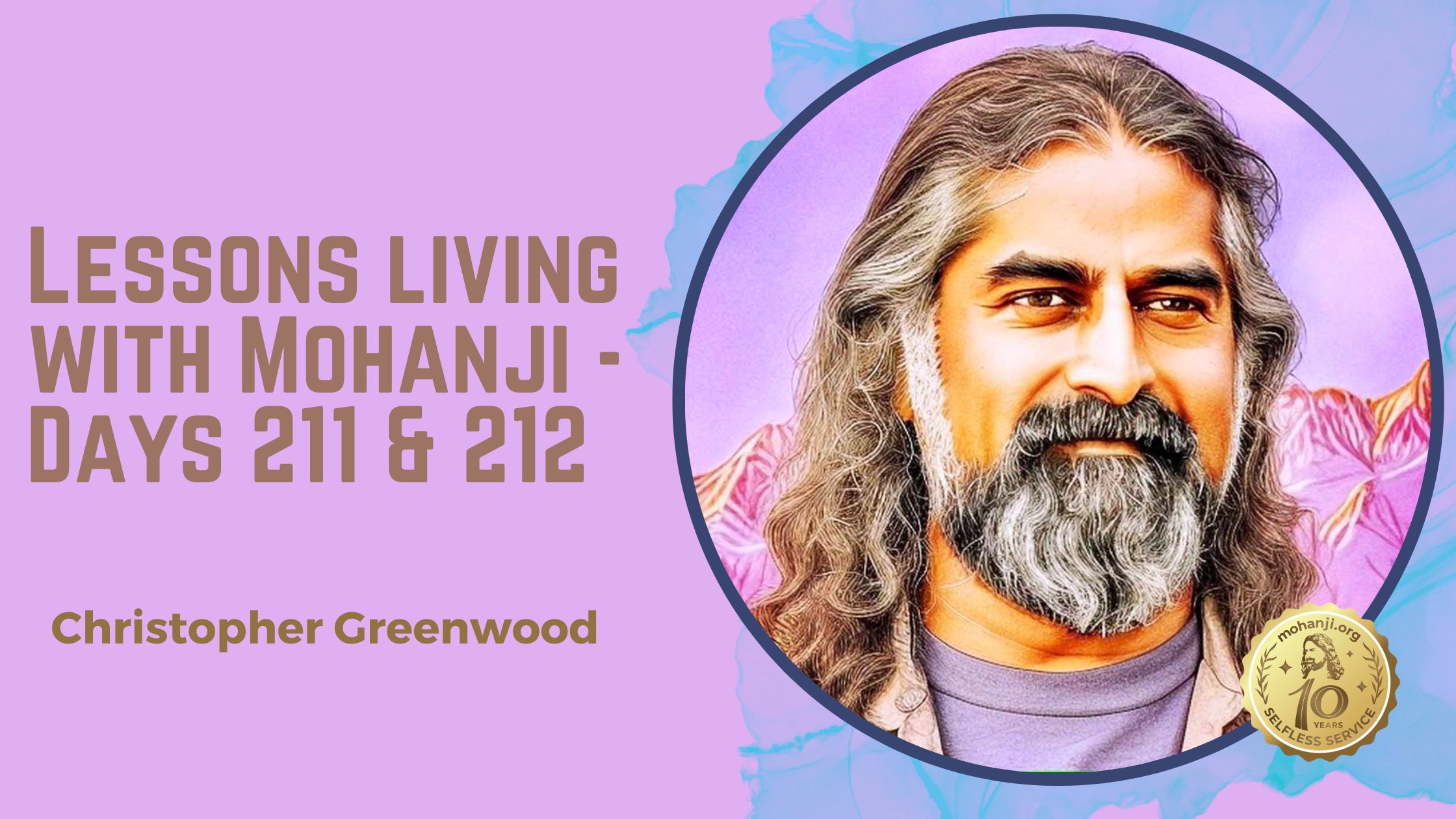by Christopher Greenwood
Day 211 – Measures of spiritual progress: People moving away
This path with Mohanji – the path of liberation, is a freedom from all bindings, patterns, habits, likes and dislikes (which we may have carried for a long time) and freedom from the mind – its push out into the world of experiences. It isn’t easy to gauge one’s progress, especially when caught up in activity and work. But a few measures that Mohanji has shared earlier are good points of reflection.
The first measure – only when you look back and see where you started- you understand what transformation happened. That’s something which I do from time to time. Mohanji shared that this is like a child growing, where you don’t see the obvious growth because it’s day by day, but you recognize when you need to buy new clothes or when they’ve outgrown those clothes.
That’s similar to our life, too. We can look at some signs to gauge that transformation, or progress, is always on what we’ve lost. That’s what I always come back to. Experiencing more freedom is losing/reducing aspects such as anger or jealousy, insecurities and fears. These have started to either drop away or their intensity reduced. There are no anxieties or unnecessary stresses.
The second measure (which we spoke about the other day) is related to frequencies. We are all frequencies, and naturally, similar frequencies attract each other. As we increase our frequency, it’s natural that our equation with others will also begin to change. I have experienced long-standing friendships fading away, which is natural. Speaking with Mohanji about this and others, this is entirely natural, is what I’ve learned.
At first, it was painful or confusing why tension happens in certain friendships or relationships, as those would have been due to habits, traits, personalities, or patterns one is expressing at that time.
As we move from our old frequency naturally, people begin to move away. But at the same time, again, more new people will come to match that current frequency. So, people who have the same vision and aspirations come together. One great thing about the Mohanji family is we have that in abundance with all the people that are part of it.
I’m always grateful for the wonderful people I interact with regularly. So this is another learning on the path or progress, you can call it, that the as we raise our frequency, it’s natural that people can begin to move away. We can take that as a sign that transformation is taking place and not something to worry about.

Day 212 – It’s not always as it appears to be
The other day, some of us were sitting with Mohanji, and he started talking about an award-winning short film he had recently watched. It was very short, less than two minutes. He liked it because it had an unexpected twist but a lasting impact. I’ll share the story first and then what I took from it, as Mohanji always shares something for a purpose.
This film is set in India and opens with a fairly well-off man who hails one of the auto-rickshaws (three-wheelers). He is seated in the back, with the driver in the front driving along. They stop at the signal and wait for some time. (If you’ve been to India, sometimes at traffic lights, you have people trying to sell things, or they come begging.)
A disabled man with a deformed leg on crutches approaches the auto-rickshaw. He’s very lean, doesn’t look too good, hasn’t had food for a while, and begs for money with his outstretched hand to the driver. The driver dismisses him and brushes him away.
The passenger watching this wonders, “Why is he doing this? This guy, he can give him something.” So, he calls over the disabled man and gives him some money. Then the traffic lights turn green, and they start driving again.
The passenger starts scolding the driver, saying, “Why don’t you give this poor man something? He’s clearly disabled; he can’t earn anything. Even if it’s just one rupee, it could have made him happy for the day; he could have bought warm tea. At least it would have given the boost.” He questions the driver, “How much do you earn in a day, maybe 1000 rupees? So, what’s one rupee to you? You can easily give this.”
The driver quietly drives on; he doesn’t say anything; he listens to the passenger. Silence ensues for the rest of the journey. They reach the destination, and the passenger goes to pay. He has a large note, a big currency note. The driver asks if he has any change, but the passenger doesn’t have change.
In a quiet, authoritative tone, the passenger tells the driver to go and get the change himself. “There’s a shop just over there; go and change it and come back.” The passenger is unhappy with what the driver did to this disabled man.
As the driver takes this money, he starts to unpack something underneath the seat from where his feet are. It’s a walking frame that has to be put together, various bits put together into a frame. It takes some time to put that together, and then he pulls himself out of the auto-rickshaw onto the frame. The passenger watches speechlessly as the driver hobbles step by step towards the shop.
It turns out that the driver is even more disabled than the man that was begging for money at the traffic lights.
You can take many things from that story. Mohanji shared that he liked it because of the impact it could make in such a short time. At one point, all would feel that the passenger is a good guy. He’s giving this poor, disabled person beggar some money, and the driver is a bad guy who doesn’t seem even to care. He’s not even talking about it.
But, in the end, you see the driver completely differently. The driver is more disabled, but he’s earning a living with integrity, and also, the driver didn’t say anything at all. He was utterly composed, silent, unaffected, and balanced despite his serious disability.
He could have easily said, “Look at me. I also have this situation, but look at me; I’m driving.” He could have been quick to fight, but he didn’t. This is also quite a powerful message.
It was a great story to reference back against Mohanji’s teachings: that we never really know what’s going on in life for somebody. We can be quick to make an opinion and form a judgement, but do we know if they are based on realities or truths, or are they just based on assumptions? A great lesson indeed.
The other lesson is the balance and stillness of the driver even though he has that situation happening around him. He was just wholly unaffected. I found that very powerful and wanted to share that today.

|| JAI BRAHMARISHI MOHANJI ||
Edited & Published by – Testimonials Team, 23rd April 2023
Disclaimer:
The views, opinions, and positions expressed by the authors and those providing comments on these blogs are theirs alone and do not necessarily reflect the views, opinions or positions of Mohanji, Mohanji Foundation, it’s members, employees or any other individual or entity associated with Mohanji or Mohanji Foundation. We make no representations as to accuracy, completeness, timeliness, suitability or validity of any information presented by individual authors and/or commenters on our blogs and will not be liable for any errors, omissions, or delays in this information or any losses, injuries or damages arising from its display or use.
We reserve the right to delete, edit, or alter in any manner we see fit blog entries or comments that we, in our sole discretion, deem to be obscene, offensive, defamatory, threatening, in violation of trademark, copyright or other laws, of an express commercial nature, or otherwise unacceptable.
Mohanji Testimonials team

